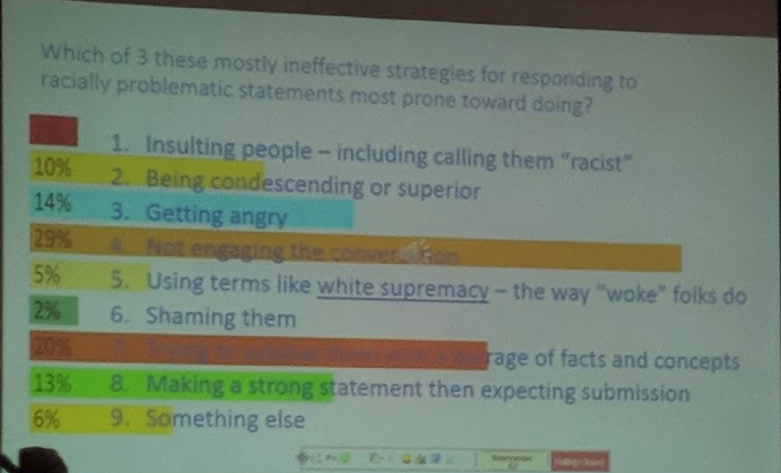This morning, I went to a workshop at the local Unitarian Universalist Congregation on how to be a better white ally in the fight against racism. The workshop was held by the renown facilitator Dr. David W. Campt, who just publish the White Ally Toolkit Workbook.
55% of white people feel that racism against white is as big of a problem as against POC. Only 19% say they have faced racism themselves.
Dr. David W. Campt
WGCU published an interview with Dr. Campt prior of his workshops. You can listen to it on their website.

You are not going to move people with facts, no matter how well you state them.
What leads toward effective encounters?
- Trying to find a point of mutual agreement
- Telling them about your experience
- Asking about values or experiences underneath their point view
- Expressing that you used to feel like they do
- Having them do thought experiments about life in different skin
- Focusing on goals you support instead of realities you oppose
- Talk about your prejudices
Strategies that focus on your own thoughts
- Conceive of the person as a vulnerable child
- Remind yourself That the listening process you are doing is part of a long-term, change process.
- Remind yourself of qualities you like about the skeptic
- Think back to a time when you very much wanted to be listen to
- Think about things you have in common with the skeptic
- Think about helpful values you hold, like empathi, curiosity and / or patience
Strategies that focus on the mind-body connection
- Get centered by taking deep breaths
- Imagine that there is a drop of superglue keeping your lips together
- Look directly into their eyes
- Touching your tongue to the roof of your mouth
- Shifting your position to one that maximizes your relaxation
- Looking directly at their lips (or forehead)
Strategies that focus on the content of the exchange
- Remind yourself that just because you listen empathetically to a point of view does not mean that you agree with it.
- Tell yourself to listen for experiences that may be similar to ones you have had
- Get ready to listen for potential opening for future conversations
- Remind yourself to listen for the underlying needs that are behind statements you will hear
- Get ready to notice things you can agree on.
About an hour into the workshop, I realized some of these strategies might also prepare you for the work as an empathetic support person on the Gutenberg plugin forum…
